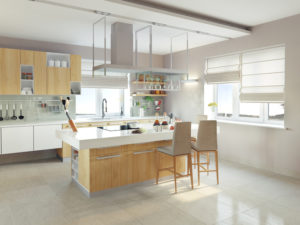When it comes to beautiful kitchen design, nothing is more important than flooring. Kitchen flooring is fundamental to determining the look and feel of your kitchen, and there is a huge selection of styles to choose from. How do you know which one is best for your floor plan? Here’s a quick rundown of all the best options.
Vinyl Flooring
Sheet vinyl is an excellent kitchen flooring option for people who are on a tight budget and want something that’s maintenance free. Sheet vinyl is very easy to clean, completely water and stain-proof, and sees very little breakage. Vinyl floors are also softer than other options, which means they’re easier on your feet when you’re cooking. However, vinyl floors in kitchens larger than 12 feet will have seams, which can trap dirt and moisture. Textured vinyl comes in many different colors and patterns, and can even mimic the appearance of ceramic tile or real stone.
Hardwood Flooring
Hardwood floors offer unmatched warmth and visual appeal. If you’re looking for something that will make sure your kitchen never goes out of style, hardwood is the choice for you. Hardwood also works well in open floor plans and creates a lovely, unified look. Hardwood floors are highly durable, relatively low maintenance, and are moisture resistant with the right finishing seal. When it comes to the kitchen you’ll want engineered wood plans (instead of solid wood strips) in order to provide stability and less wear from humidity and temperature.
Porcelain Tile
When it comes to durability in the kitchen, you won’t find a better option than porcelain tile. Porcelain tile is fired at high temperatures to make it extremely hard, stain-resistant and impervious to moisture. Porcelain is so strong that it’s often used in outdoor kitchens as well. Glazed tiles will provide your kitchen with a glass-like coating that comes in virtually any color.
Cork Flooring
Cork flooring is made from tree bark harvested every eight to 10 years. Cork floors are the most eco-friendly choice and provide a softer style than wood or tile. Cork is waterproof and compressible, making it slip resistant. Cork also comes in unique grain patterns, swirls, or speckles. Unlike other options, however, Cork requires some maintenance in that it needs to be resealed every three to four years in order to prevent scratches and moisture from entering the seams.
Upgrade Your Kitchen with C.C. Dietz
Looking to upgrade your home’s kitchen with some new flooring? Contact C.C. Dietz! If you’re ready to get started on your next remodeling project, we’re here to help from planning to installation. If you’d like to schedule a free consultation, please contact us by calling 717.755.1921 or visit our website! Also, be sure to follow us on Facebook, Twitter, Google+, and LinkedIn. 1

